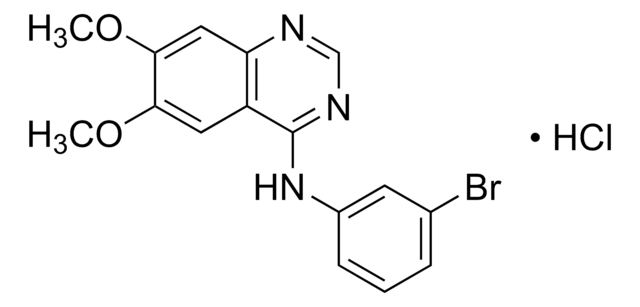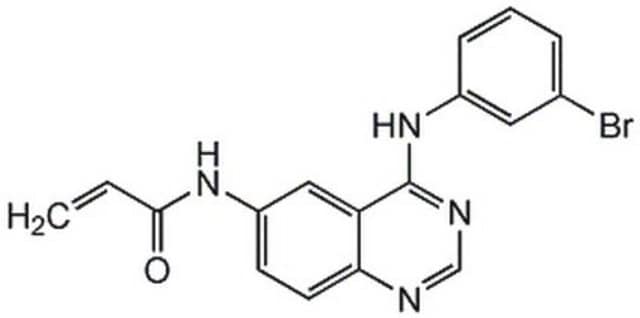658552
AG 1478
A cell-permeable, reversible, ATP-competitive, highly potent and selective inhibitor of epidermal growth factor receptor kinase versus HER2-neu and platelet-derived growth factor receptor kinase.
Sinónimos:
AG 1478, 4-(3-Chloroanilino)-6,7-dimethoxyquinazoline
About This Item
Productos recomendados
Quality Level
assay
≥98% (HPLC)
form
solid
manufacturer/tradename
Calbiochem®
storage condition
OK to freeze
protect from light
color
pale yellow
solubility
DMSO: 5 mg/mL
shipped in
ambient
storage temp.
−20°C
InChI
1S/C16H14ClN3O2/c1-21-14-7-12-13(8-15(14)22-2)18-9-19-16(12)20-11-5-3-4-10(17)6-11/h3-9H,1-2H3,(H,18,19,20)
InChI key
GFNNBHLJANVSQV-UHFFFAOYSA-N
General description
Biochem/physiol Actions
Epidermal growth factor receptor kinase
Warning
Preparation Note
Reconstitution
Other Notes
Liu, W., et al. 1999. J. Cell Sci.112, 2409.
Eguchi, S., et al. 1998. J. Biol. Chem. 273, 8890.
Levitzki, A., and Gazit, A. 1995. Science267, 1782.
Fry, D.W., et al. 1994. Science265, 1093.
Osherov, N., and Levitski, A. 1994. Eur. J. Biochem.225, 1047.
Ward, W.H., et al. 1994. Biochem. Pharmacol.48, 659.
Legal Information
Storage Class
11 - Combustible Solids
wgk_germany
WGK 3
Certificados de análisis (COA)
Busque Certificados de análisis (COA) introduciendo el número de lote del producto. Los números de lote se encuentran en la etiqueta del producto después de las palabras «Lot» o «Batch»
¿Ya tiene este producto?
Encuentre la documentación para los productos que ha comprado recientemente en la Biblioteca de documentos.
Nuestro equipo de científicos tiene experiencia en todas las áreas de investigación: Ciencias de la vida, Ciencia de los materiales, Síntesis química, Cromatografía, Analítica y muchas otras.
Póngase en contacto con el Servicio técnico








